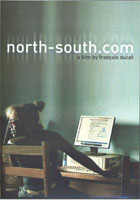
north-south.com 2007
Distributed by Icarus Films, 32 Court St., 21st Floor, Brooklyn, NY 11201; 800-876-1710
Produced by François Ducat
Directed by François Ducat
DVD, color, 53 min.
College - Adult
Multicultural Studies, Belgium, Cameroon, African Studies, Women's Studies
Date Entered: 12/17/2009
Reviewed by Janis Tyhurst, Reference Librarian, George Fox UniversityFrançois Ducat produced this film because of the rising number of European-African marriages he saw occurring in Europe. He concentrates on Cameroonian women who actively look for white men to marry, how they go about finding candidates, their reasons for looking outside their own culture and what happens when they do make a serious connection. He relies more on interviews than data or research to present the issues. Nonetheless, the interviews provide a deeper look into the motivations these women have to leave their country and culture. Ducat does an excellent job of letting his interviewees tell their story and not making any judgments. What I found fascinating was the amount of cultural stereotyping that both the Cameroonian women and the European men engage in, using it as fact. The film also highlights the perils of cross cultural Internet dating, which are not very different from regular Internet dating. The film has seven chapters and is in French with excellent English subtitles.
Ducat interviews six Cameroonian women—two sisters who are searching the Internet for potential mates (one of the sisters is only 15 years old), three who married Europeans and one who went to France thinking she would marry and ended up forced into prostitution for 9 months. Ducat also interviews the Internet Café owners about their business and the spouses of the two Cameroonian women. The two women searching for Internet spouses explain their motivations in a Q & A interview. They explain that they would have a better life in Europe, they would not have to work, they would have a better standard of living, and European men would not beat them but rather would love them. When asked about the perils of meeting men online, both agreed that they had heard stories but seemed to think that it would not happen to them, or if the man misrepresented himself, they would just leave.
Of the women who married European men, only one seems to be very happy with her marriage. The other two are unhappy for various reasons. Once in Europe they discover that while they have a higher standard of living, people still have to work. They encounter racism from European in-laws and discover that cross cultural living is hard. One woman left her children with her mother, but her mother died shortly after she marries and now she is riddled with guilt over leaving her children. Her new husband does not seem inclined to take in her children.
Interviews with the men sheds light on how Cameroonian and European men view the Cameroonian women. The Cameroonian men are scornful of the women, saying that they will do whatever to find a white man, but they too emphasize that poverty in Cameroon is widespread and women are desperate. One of the European men, a Belgian, who married a Cameroonian woman, explains his reasons for marrying a Cameroonian woman. He believes that African women are born to serve their husband and to have children, unlike European women who ‘grow apart from their husband.’
The perils of the Internet to find a spouse are also explored. One woman, Mandy, recounts her story. She went to Paris to meet a potential spouse and ended up being forced into prostitution for 9 months. She only escaped when she ran into some other Cameroonians who spoke her native tongue and asked for their help. Another Cameroonian woman has classified male Internet behavior by nationality, explaining that the Arabs are poetic liars, the Canadians are into phone sex, the Americans are all talk and no marriage, and the French exhibit all of these behaviors. In many cases, after the initial contact, the men will ask for nude photos of the women before they consider moving the relationship forward.
This will be valuable for contemporary African women studies, sociological studies on the impact of the Internet in Africa and Women’s studies on marriage and cross cultural marriage.